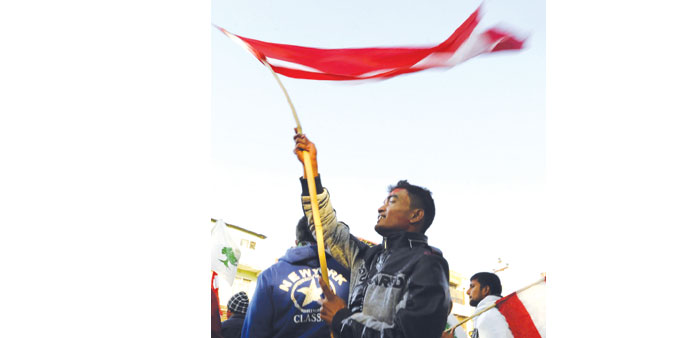|
The Nepali Congress yesterday took a narrow lead over the CPN-UML in polls to elect constituent assembly that will draft Nepal’s new constitution, while the Maoists led by Pushpa Kamal Dahal aka Prachanda were headed for a humiliating defeat. |
Nepali Congress (NC) won 98 seats while the CPN-UML bagged 88 out of the 226 seats declared so far. The Unified CPN-Maoist was trailing far behind in the third position with 24 seats. Other fringe parties won 16 seats.
After suffering a humiliating defeat in a constituency in Kathmandu, where he finished third, UCPN-Maoist chief Prachanda was yesterday elected from a seat in Siraha in southern Nepal by a margin of just 900 votes. He secured 15,244 votes to defeat his nearest rival Lila Shrestha of CPN-UML.
Nepal’s Maoists are threatening to boycott the newly-elected constituent assembly, alleging conspiracy.
Madhesi Peoples Rights Forum-Democratic won in four constituencies while the Rastriya Prajatantra Party and the Terai Madhes Democratic Party bagged three
seats each.
Madhesi Peoples Rights Forum-Nepal won two seats while three fringe parties and an independent candidate claimed one
constituency each.
The counting of votes, under the proportionate system also got under way yesterday morning. The CPN-UML was in the lead in the vote count with 45,000 votes. NC got 31,160 votes while UCPN-M bagged
24,109 votes.
Analysts said the race to control the 601-member constituent assembly was now mainly between the Jhalanath Khanal-led CPN-UML and NC headed by Sushil Koirala.
The counting will lead to the formation of a constituent assembly, including 240 elected under a direct voting system.
Proportionate voting will elect members to 335 seats and the remaining 26 members will be nominated by the government.
A party needs a total of 301 seats to get an absolute majority.
The vote was only the second one since a civil war launched by Maoist rebels ended in 2006. Nepal was then transformed into a secular republic.
The country plunged into a constitutional crisis after the previous constituent assembly was dissolved without promulgating the constitution last year, and fresh elections scheduled for November 2012 were not held.
With the formation of an election government led by Khil Raj Regmi in March, parties agreed after prolonged talks to conduct the polls in June or by December.
Political infighting, including a split in the ruling Maoist party last year, confounded efforts to implement a peace plan meant to rebuild Nepal after the 10-year civil war.

